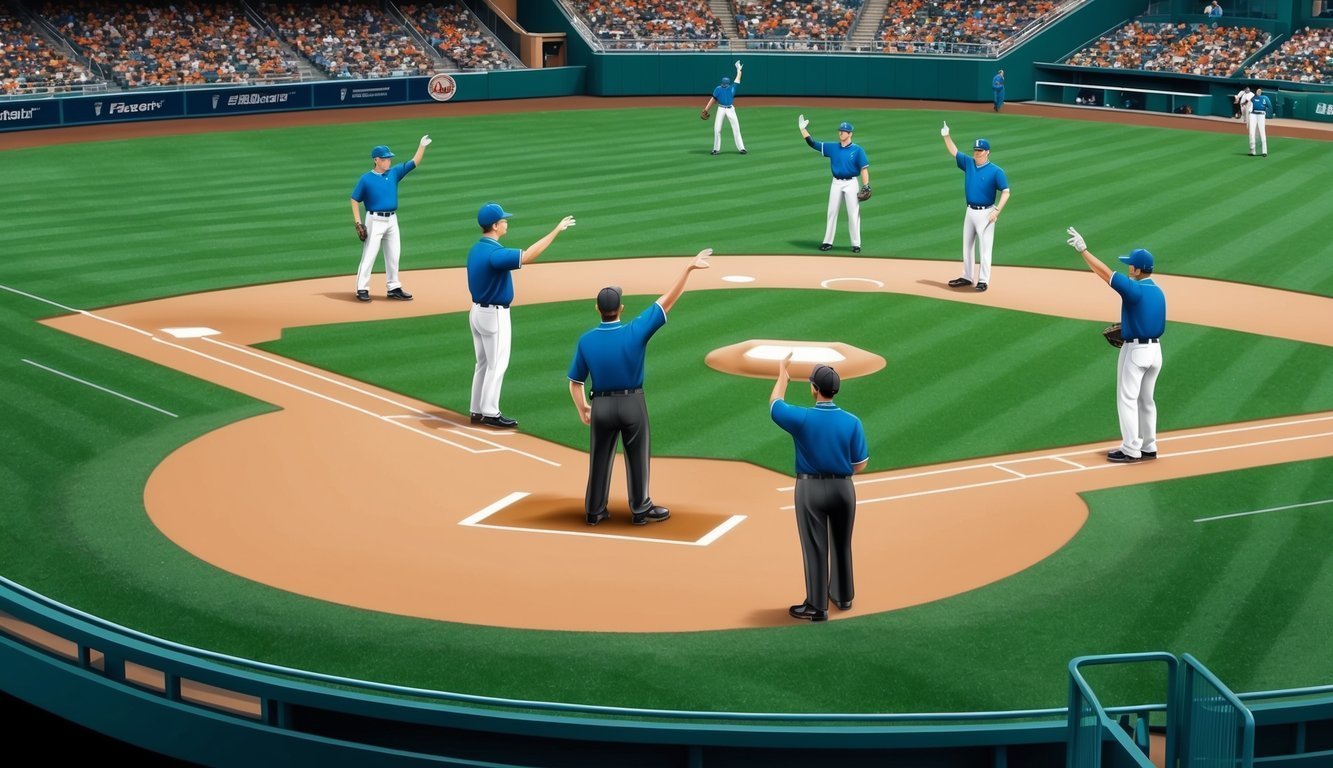MLB umpires play a crucial role in America’s favorite pastime, ensuring fair play and enforcing the rules of baseball.
Many fans wonder about the financial compensation these officials receive for their work on the diamond.
MLB umpires earn an average salary of $300,000 per year, with top-tier officials making up to $450,000 annually. This puts them among the highest-paid sports officials in the United States.
Their salaries reflect the intense scrutiny and pressure they face during every game.
The path to becoming an MLB umpire is long and challenging.
Aspiring officials often start in the minor leagues, where pay is significantly lower.
Minor league umpires may earn as little as $2,000 per month, working their way up through various levels before reaching the majors.
The journey can take a decade or more, but for those who make it to the big leagues, the financial rewards are substantial.
Umpiring in MLB
Umpiring in Major League Baseball is a prestigious and challenging career.
It requires extensive training, experience, and a deep understanding of the game’s rules and nuances.
Becoming an MLB Umpire
The path to becoming an MLB umpire is long and competitive.
Aspiring umpires typically start by attending one of two professional umpiring schools in Florida.
These schools offer intensive 5-week courses covering rule knowledge, positioning, and game management.
Top graduates may be selected for the Minor League Baseball Advanced Course.
From there, successful candidates begin umpiring in rookie ball leagues.
Umpires then work their way up through various minor league levels over several years.
Only the best minor league umpires are considered for MLB positions.
It often takes 7-10 years of minor league experience before getting a shot at the majors.
MLB hires very few new umpires each year, making it highly selective.
The Role of an MLB Umpire
MLB umpires have crucial responsibilities on the field.
They make split-second decisions that can impact the outcome of games.
Their main duties include:
- Calling balls and strikes
- Making safe/out calls on the bases
- Ruling on fair/foul balls
- Enforcing MLB rules and regulations
- Managing the pace of play
Umpires must remain impartial and handle high-pressure situations with composure.
They often face scrutiny from players, coaches, and fans.
During the regular season, umpires work in four-person crews.
They rotate positions each game, taking turns behind home plate and on the bases.
Training and Requirements
MLB umpires undergo continuous training to stay sharp.
They attend seminars in the offseason to review rules and discuss situational scenarios.
Umpires must pass annual physical fitness tests and eye exams.
Key requirements for MLB umpires include:
- Excellent eyesight and quick reflexes
- In-depth knowledge of baseball rules
- Strong communication and conflict resolution skills
- Physical stamina to work long games in various weather conditions
- Ability to travel extensively during the season
Umpires must also maintain a professional appearance and demeanor both on and off the field.
They represent MLB and are expected to uphold the integrity of the game at all times.
Salary and Compensation
MLB umpires earn substantial salaries, with additional pay for postseason work and various perks.
Their compensation reflects the high-stakes nature of their job and years of experience required to reach the major leagues.
In addition to their salaries, umpires often benefit from comprehensive health insurance and retirement plans, making their financial package quite competitive.
This is particularly relevant when compared to the aaa baseball player salary overview, which varies significantly depending on the player’s experience and performance level.
Ultimately, the compensation for umpires underscores the crucial role they play in maintaining the integrity of the game.
Regular Season and Postseason Pay
MLB umpires’ salaries range from $150,000 to $450,000 per year during the regular season.
Newer umpires typically start at the lower end, while veterans can earn the higher amounts.
The average salary sits around $235,000 annually.
Postseason work brings extra income.
Umpires selected for playoff series receive about $17,500 per series.
World Series assignments come with an additional $20,000 bonus.
This means a busy umpire could potentially earn over $70,000 in postseason pay alone.
Additional Earnings and Perks
Beyond base salaries, MLB umpires enjoy several benefits.
They receive per diem allowances for meals and incidentals during away games.
The league covers travel expenses and provides first-class accommodations.
Umpires also get four weeks of paid vacation during the season.
Health insurance and a pension plan round out their benefits package.
Some umpires can earn extra by working spring training games or participating in MLB-sponsored clinics.
Senior Umpire Compensation
Experience pays off for senior umpires.
Those with 20+ years of service can earn upwards of $450,000 annually.
The most seasoned officials might make close to $500,000 per year.
Senior umpires often get preferred assignments, including more home plate duties.
They’re also more likely to be selected for high-profile games and postseason series.
This can significantly boost their earnings through bonuses and exposure.
Professional Development

MLB umpires undergo extensive training and evaluation throughout their careers.
They must continually refine their skills and knowledge to maintain high standards of officiating.
Advancement Through the Ranks
Aspiring MLB umpires start in the minor leagues, working their way up through various levels.
They begin in rookie leagues, progressing to Single-A, Double-A, and Triple-A. This journey can take 7-10 years or more.
At each level, umpires gain valuable experience and face increasingly challenging situations.
They must demonstrate consistent accuracy, good judgment, and strong game management skills to advance.
Top-performing minor league umpires may receive opportunities to work MLB spring training games or fill in for regular season games as needed.
Continued Education and Evaluation
MLB umpires participate in annual spring training camps to review rules, discuss new interpretations, and practice game scenarios.
They also attend mid-season clinics to address emerging issues.
Throughout the season, umpires are evaluated on every game they work.
MLB uses advanced technology, including pitch-tracking systems, to assess their ball and strike calls.
Supervisors review game footage and provide feedback on positioning, mechanics, and game management.
Umpires must maintain a high level of accuracy and consistency to retain their positions.
The league also offers mentoring programs, pairing newer umpires with experienced veterans to foster growth and improvement.
The Life of an Umpire

MLB umpires face unique challenges and rewards in their careers.
They navigate a demanding schedule, intense scrutiny, and the need to balance work and personal life.
Travel and Schedule
MLB umpires are road warriors during the baseball season.
They typically work in four-person crews, traveling from city to city for most of the year.
Umpires officiate about 142 games per season, spending up to 200 days away from home.
Their schedule can be grueling, with back-to-back series in different cities.
They might call a night game in New York, then fly to Chicago for an afternoon game the next day.
Crew chiefs have additional responsibilities, coordinating travel arrangements and managing the team’s schedule.
Despite the challenges, many umpires enjoy exploring new cities and ballparks across the country.
Pressure and Public Scrutiny
Umpires face intense pressure to make split-second decisions that can impact the outcome of games.
Every call is scrutinized by players, managers, fans, and millions of viewers at home.
Controversial calls, especially those involving home runs or close plays at the plate, can lead to heated arguments and even ejections.
Social media and instant replays have increased the spotlight on umpires’ performance.
Experienced umpires develop thick skin and the ability to stay calm under pressure.
They must maintain their composure even when faced with angry players or booing crowds.
Work-Life Balance
Balancing work and personal life can be challenging for MLB umpires.
The demanding travel schedule often means missing important family events and holidays during the season.
Many umpires find creative ways to stay connected with loved ones, using video calls and planning special off-season activities.
Some bring their families on the road for short trips when possible.
The off-season provides a chance to recharge and spend quality time at home.
Umpires often use this time to stay in shape, study rule changes, and prepare for the next season.
Notable Figures and Moments

MLB umpires have played crucial roles in shaping baseball history.
Their decisions and personalities have left lasting impacts on the game, creating unforgettable moments for fans and players alike.
Famous MLB Umpires
Joe West stands out as one of the most recognizable umpires in MLB history.
Known as “Cowboy Joe,” he officiated a record-breaking 5,460 games during his 45-year career.
West’s colorful personality and occasional controversies made him a household name among baseball fans.
Angel Hernandez is another well-known umpire, though often for contentious reasons.
His calls have sparked debates and led to memorable confrontations with players and managers.
Experienced umpires like Jim Joyce have also made their mark.
Joyce’s incorrect call that cost Detroit Tigers pitcher Armando Galarraga a perfect game in 2010 became a teachable moment about sportsmanship and integrity.
Memorable Calls and Games
Some of baseball’s most dramatic moments have involved umpires.
In the 1985 World Series, Don Denkinger made a controversial safe call at first base in Game 6.
This changed the series outcome and led to heated discussions about the need for instant replay.
The 2009 one-game playoff between the Twins and Tigers featured several close calls.
Umpire Randy Marsh’s decisions played a crucial role in the extra-inning thriller.
World Series and playoff games often showcase the highest level of umpiring.
These high-stakes situations test an umpire’s ability to make correct calls under immense pressure.
Every ball and strike could potentially alter the course of baseball history.
